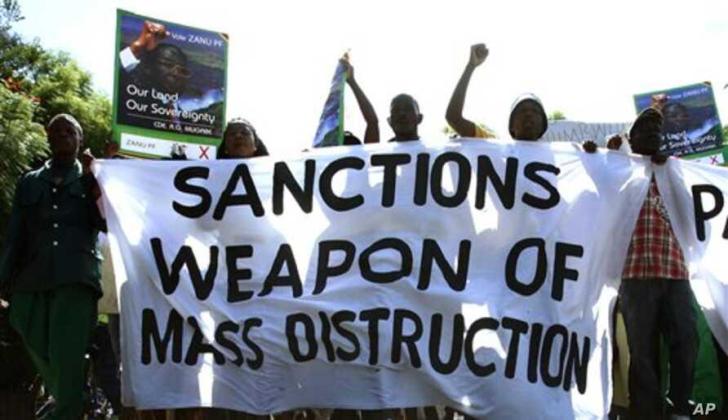Malawi has urged the United States of America and European countries to lift sanctions imposed on Zimbabwe.
In 2001, the United States Congress enacted the Zimbabwe Democracy and Economic Recovery Act (ZDERA), ostensibly to support the people of Zimbabwe in their pursuit of peaceful, democratic change and equitable economic growth.
ZDERA was enacted in response to Zimbabwe’s “fast-track land reform” programme to reclaim land previously taken by white settlers. ZDERA restricted multilateral financing to Zimbabwe.
Speaking during the 44th Independence Day celebrations on Friday in Lilongwe, Malawi’s Minister of Foreign Affairs, Nancy Tembo, said her country supports the call by SADC Heads of State and Government for the immediate lifting of economic sanctions against Zimbabwe. Said Tembo (via Nyasa Times):
You will recall that the SADC Summit which was held in the United Republic of Tanzania in 2019, designated 25th October as the date which all SADC member states should collectively voice their disapproval of the sanctions through various activities and platforms until the sanctions are lifted.
Although the date has since passed and it will also come later this year, I would like to reiterate Malawi’s support to the call by the SADC Heads of State and Government for the immediate lifting of prolonged economic sanctions against Zimbabwe.
Tembo said that Zimbabwe, as a developing country, needs support to develop, and not sanctions which can can limit free flow of goods.
She then praised the strong bilateral relations and cooperation between Malawi and Zimbabwe which are strengthened through cooperation under the Malawi/Zimbabwe Joint Permanent Commission of Cooperation (JPCC) in sectors of trade, customs and transport among others.
In her remarks, Zimbabwean Ambassador to Malawi, Nancy Saungweme, said:
The sanctions have negatively impacted the economy and the livelihoods of the general people and must be removed immediately and unconditionally.
I call on our friends in the region and the international community at large to partner with us in implementing Zimbabwe’s national development strategy for our mutual benefit.
Saungweme said that trade between Malawi and Zimbabwe was thriving but the sanctions imposed on Zimbabwe severely hampered the country’s ability to produce goods for trade.
Meanwhile, early this year, US President Joe Biden issued an executive order repealing the first order issued in March 2003 which blocked property of several political leaders in Zimbabwe for “undermining democratic processes or institutions in Zimbabwe.”
However, that same month, the United States Department of the Treasury’s Office of Foreign Assets Control (OFAC) designated 11 Zimbabwean individuals including President Emmerson Mnangagwa, who became the first sitting head of State to be designated by the US under its Global Magnitsky Programme.
They were designated for their alleged involvement in corruption and serious human rights abuse.
The list also includes Mnangagwa’s wife, Auxillia, Vice-President Constantino Chiwenga, Defence minister Oppah Muchinguri, Midlands Provincial Affairs minister Owen Ncube, Central Intelligence Organisation deputy director Walter Tapfumaneyi, businessman Obey Chimuka and tycoon Kudakwashe Tagwirei as well as his wife Sandra.
Sakunda Holdings, Fossil Agro, and Fossil Contracting, linked to Tagwirei and Chimuka, were also placed on the new sanctions list.
